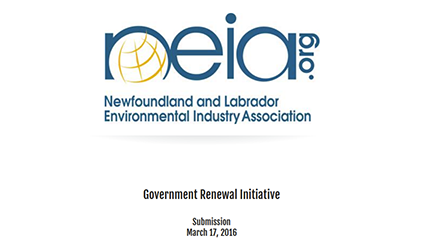Green Tech
- The provision of over $1 billion (over 4 years) to support clean technology, including in the forestry, fisheries, mining, energy and agriculture sectors. Further details about the allocation of this funding will be provided in the coming months as part of the implementation of the Government’s Innovation Agenda.
- $50 million (over 4 years) to Sustainable Development Technology Canada (SDTC) for the SD Tech Fund. These resources will enable SDTC to announce new clean technology projects in 2016 that support the development and demonstration of new technologies that address climate change, air quality, clean water, and clean soil.
- $82.5 million (over 2 years) to Natural Resources Canada (NRC) to support research, development and demonstration of clean energy technologies.
- $50 million (over 2 years) to NRC to invest in technologies that will reduce greenhouse gas emissions from the oil and gas sector.
- Regional Development Agencies (such as ACOA) will double their annual aggregate support for clean technology to $100 million per year, from existing resources.
Municipalities
- $75 million in new funding for local governments to address climate change, to be delivered by the Federation of Canadian Municipalities (FCM). This investment will support municipality-led projects to identify and implement greenhouse gas reduction opportunities, including the assessment of local climate risks and the integration of these impacts into asset management plans.
- A $125 million (over 2 years) enhancement of the FCM’s Green Municipal Fund, including for projects that reduce greenhouse gas emissions. This fund finances innovative municipal green infrastructure priorities – including those that will reduce greenhouse gas emissions.
- A new $50 million capacity-building fund to support the use of asset management best practices across Canada, helping communities plan how core infrastructure assets are to be built, renewed, operated, maintained and replaced.
Water and Waste Water
- A new Clean Water and Wastewater Fund for provinces, territories and municipalities. The $2 billion investment (over 4 yea rs) aims to achieve immediate improvements to water distribution and treatment infrastructure. Funding will begin to be delivered to communities this year, on an expedited basis.
- An additional $1.8 billion (over 5 years) to support clean drinking water and the treatment of wastewater on reserve.
- $141.7 million (over 5 years) to improve the monitoring and testing of on reserve community drinking water.
Transportation
- A new Public Transit Infrastructure Fund, totalling $3.4 billion (over 3 years) with a focus on public transit efficiency and reduction of emissions. $4.9 million of this fund will be allocated to Newfoundland and Labrador.
- $62.5 million (over 2 years) to NRC to support the deployment of infrastructure for alternative transportation fuels, including charging infrastructure for electric vehicles and natural gas and hydrogen refuelling stations. These resources will also support technology demonstration projects that advance electric vehicle charging technology.
- Expanded eligibility for accelerated capital cost allowance (CCA) for electric vehicle charging infrastructure. This builds on CCAs for equipment that generates energy by using renewable energy sources, with the understanding that these technologies are complementary.
- $56.9 million (over 2 years) to Transport Canada and Environment and Climate Change Canada to support the transition to a cleaner transportation sector.
Sector Development
- Up to $800 million (over 4 years) to support innovation networks and clusters.
- A new High-Impact Firm Initiative to help participating firms scale up and further their global competitiveness through coordinated services tailored to their needs.
- Up to $2 billion (over 3 years) a new Post-Secondary Institutions Strategic Investment Fund. Aimed at enhancing and modernizing research and commercialization facilities at industry-relevant campuses and training facilities, the fund will support infrastructure and affiliated research and commercialization organizations, and projects that reduce greenhouse gas emissions and improve the environmental sustainability of these types of facilities.
Other Investments
- Establishment of a Low Carbon Economy Fund. The $2 billion fund (over 2 years) will support provincial and territorial actions that materially reduce greenhouse gas emissions and are incremental to current plans, and achieve significant reductions within the period of Canada’s nationally determined target. Resources will be allocated towards those projects that yield the greatest absolute greenhouse gas reductions for the lowest cost per tonne.
- $3.4 billion (over 5 years) to address climate change and air pollution, protect ecologically sensitive areas and restore public trust in the environmental assessment processes.
- $10.7 million (over 2 years) for Indigenous and Northern Affairs Canada to implement renewable energy projects in off-grid Indigenous and northern communities that rely on diesel and other fossil fuels to generate heat and power
- $409 million (over 5 years) to support efforts to improve how garbage and waste is managed on reserve.
- $573.9 million (over 2 years) to support energy and water efficiency retrofits and renovations to existing social housing.
- Expanded eligibility for CCA to explicitly allow a much broader range of electrical energy storage equipment.
Institutional
- $128.8 million (over 5 years) to NRC to deliver energy efficiency policies and programs, and maintain clean energy policy capacity. These resources will support improved energy efficiency standards and codes for products, buildings, industry and vehicles, and further the development of a legislative framework for offshore renewable energy projects.
- $345.3 million (over 5 years) to Environment and Climate Change Canada, Health Canada and the National Research Council to take action to address air pollution in Canada. The funding will allow these organizations to conduct research on and monitor air pollution sources as well as health and environmental impacts; report to Canadians on air pollution sources and on local, regional and national air quality; continue to implement the Air Quality Management System jointly with provinces and territories; administer and enforce existing regulatory and non-regulatory instruments to reduce air pollution; and maintain the economic and policy capacity to develop new policy approaches and regulatory instruments to improve air quality.
- $81.3 million (over 5 years) to Fisheries and Oceans Canada and NRC to support marine conservation activities, including the designation of new Marine Protected Areas under the Oceans Act.
Link:
2016 Federal Budget
http://www.budget.gc.ca/2016/docs/plan/budget2016-en.pdf






